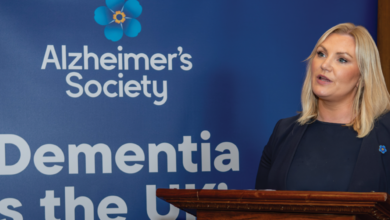Dementia in Northern Ireland: where do we stand?

The growing number of dementia cases in Northern Ireland has prompted politicians to act. The Mental Health Capacity (NI) Act passed into law in May 2016, with its Code of Practice currently being developed by the Department of Health. Whilst three out of five of the main political parties in Northern Ireland have outlined dementia as a specific commitment in their priorities, initiatives such as The Prime Minister’s Dementia Challenge and Dementia Friends have helped to strengthen public focus on the need to enable people with dementia to live well for as long as they can.
There are over 20,000 people estimated to be living with dementia in Northern Ireland. Despite the large number dementia cases, it is believed that only 64.8 per cent have been diagnosed. According to the Office for National Statistics, the number of dementia-related deaths in Northern Ireland will increase by 29 per cent by 2037 from that in 2014.
Across Northern Ireland, it is rare to meet someone whose life hasn’t been touched by dementia. The progressive neurodegenerative disease worsens over time, gradually restricting the quality of life of those who suffer from it. These symptoms include memory loss, confusion, speech problems, mood and behavioural difficulties and, most commonly, a damaged sense of self-care, confidence and daily living.
Dementia does not have one single cause. The disease is caused by a range of underlying health conditions, which are generally more common in elderly people. The conditions which lead to dementia include Alzheimer’s, vascular dementia, dementia with Lewy bodies and fronto-temporal dementia.
Under Section 3, the Mental Health Capacity (NI) Act includes:
- 3.— a person who is 16 or over lacks capacity in relation to a matter if, at the material time, the person is unable to make a decision for himself or herself about the matter (within the meaning given by section 4) because of an impairment of, or a disturbance in the functioning of, the mind or brain.
Section 76 defines a carer as:
- a person who is 16 or over and provides a substantial amount of care for and support to person on a regular basis; and on a domestic basis; or where person is living in a relevant place, provided a substantial amount of care for and support to person on a regular basis and on a domestic basis, before the relevant time.
Information provided by Marie Curie, the Office for National Statistics and the Alzheimer’s Society of Northern Ireland






